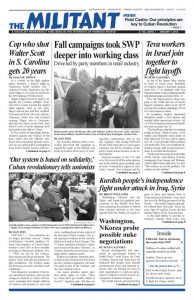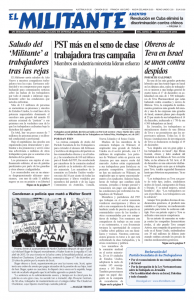In a victory in the fight against police brutality, a federal judge in Charleston, South Carolina, Dec. 7 sentenced North Charleston cop Michael Slager to 20 years in prison for the 2015 killing of Walter Scott.
Slager stopped Scott on April 5, allegedly for a broken taillight. Scott, who had a bench warrant for unpaid child support, tried to run away. Slager chased him and they scuffled. The unarmed Scott, who was African-American, broke free and resumed running. Slager, who is Caucasian, shot him five times in the back, then tried to cover it up by claiming Scott had grabbed the officer’s Taser.
In the context of spreading demonstrations against cop violence at the time, police and city officials were faced with immediate protests and a call for an independent investigation from Scott’s family, leaders of the International Longshoremen’s Association and community groups.
Two days after the shooting a cellphone video taken by Feidin Santana, a barber who was on his way to work, was made public. It not only showed Slager shooting Scott in the back, but also dropping an object that looked like a stun gun near the body. The North Charleston Police Department fired Slager the next day.
Murder charges against him ended in a mistrial in December 2016, but in a plea deal in May this year Slager admitted guilt to violating Scott’s civil rights by using excessive force against him.
Slager’s attorneys argued that the shooting was of manslaughter severity, while prosecutors said it was akin to second-degree murder and called for life imprisonment. U.S. District Judge David Norton, calling the shooting “reckless, wanton and inappropriate,” condemned Slager to 20 years in prison.
Walter Scott’s family members expressed satisfaction with the sentence. His mother, Judy Scott, and brothers Rodney and Anthony Scott, all said they forgave Slager.
“The sentence is severe enough — and jail time for policemen is a big thing, it doesn’t happen that often,” Dwayne German, 58, a maintenance worker at The Citadel military college in Charleston, said by phone Dec. 18. “But the evidence, the video, everything pointed to Slager’s guilt. Walter Scott wasn’t shot in the chest, he was shot in the back, so it was hard to argue self-defense.”
I met German when I traveled to North Charleston to join the protests against Scott’s killing and to cover the fight to bring Slager to justice for the Militant. German’s stepson, 19-year-old Denzel Curnell, died in police custody in June 2014.
“Those who enforce our laws must also abide by them — and this Department of Justice will hold accountable anyone who violates the civil rights of our fellow Americans,” Attorney General Jeff Sessions said in a statement. “On behalf of the Department of Justice, I want to offer my condolences to the Scott family and loved ones.”
“Officers rarely receive any prison sentence at all for their crimes, and while Officer Slager is receiving what some may see as a strong sentence, we know that no punishment can repair the hole left in the lives of his loved ones,” Sherrilyn Ifill, president and director-counsel of the NAACP Legal Defense and Educational Fund, said in a statement. “The fact is that Walter Scott should be alive today.”
“It wasn’t enough but I’m glad he didn’t get off the hook,” Evangeline Michelle Felder, 60, a certified nursing assistant in Charleston, said by phone Dec. 18. “Twenty years was better than nothing. A lot of us thought he would get off with a slap on the hand.”

